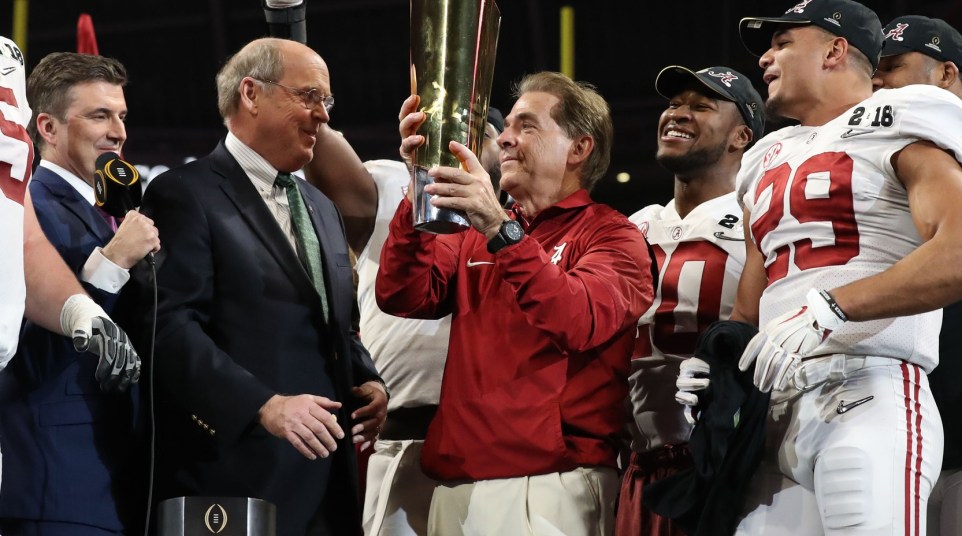
Nick Saban, Scott Frost, and why national title claims of a bygone era are irrelevant in 2018
If you thought faux national championship claims were a thing of the past in the Playoff era, you’d be wrong. In fact, they’ve been one of the more trending topics in the offseason headlines as UCF has proclaimed itself the “rightful” 2017 national champion following an undefeated season.
You can see the banners or the words plastered to the wall in many stadiums across the country on any given Saturday. National Champions. Some will make you scratch your head, like Minnesota, which claims seven between 1904 and 1960. Or Syracuse, which has one from the 1959 season.
Sure, in the modern era of college football, it’s easy to scoff at the idea that such programs are “national title winning” programs, but based on the old system — where the media voted who was No. 1 at the end of the regular season — that’s the way the king was rightfully crowned.
To many, Alabama is the biggest offender of this. The Crimson Tide faithful proudly flaunt their 17 national championships earned between 1925 and last season’s College Football Playoff finale victory over Georgia. The 1934 and 1941 national championships, for example, aren’t even recognized by the NCAA or the Associated Press. In fact, Alabama finished No. 20 in the final AP rankings at the close of the 1941 regular season.
There are others, probably the most notable being the 1964 season when top ranked Crimson Tide fell to No. 5 Texas, 21-17 in the Orange Bowl while Arkansas, which had beaten Texas for the Southwest Conference championship, finished 11-0. The idea of Alabama taking credit for that one might seem farcical now, but the system in 1964 called for the No. 1 team in the land to be determined before the bowl season.
Because of this, fans — particularly UCF fans — took offense to Nick Saban’s remarks to USA Today earlier this week when he questioned the legitimacy of the Knights’ 2017 national championship claim in the current system. His sentiments prompted former UCF and current Nebraska head coach Scott Frost to fire back about the legitimacy of Alabama’s titles on Wednesday.
The truth is, we can debate this subject for the next 100 days or so until the 2018 season kicks off, but Saban is right. The argument of whether Alabama should recognize all 17 championship seasons is lazy, but often used regarding the results of the 2017 season. Is it ridiculous for Alabama to say that all 17 of those titles are legitimate? Sure. But it was a completely different era of college football. It’s why we changed that system, first with the BCS and most recently the Playoff.
Scott Frost, the UCF fanbase, or Danny Kanell can counter Saban’s argument with whether or not the 1941, or 1926, or 1964 championships are permissible, but what it comes down to is this: It’s the year 2018. We have a playoff system that puts the four best teams in the country, pits them against each other and whoever is left standing is the best team in America.
Throwing shade at a university who ran the table and beat the best team in the SEC seems petty. Calling them out for "self-proclaimed" titles is downright hypocritical considering half your school's titles are self proclaimed.
— Danny Kanell (@dannykanell) May 16, 2018
Now, if UCF wants to argue it deserve a Playoff birth, that’s whole other dispute. UCF certainly isn’t the first mid-major to take issue with the BCS or Playoff system. Utah did it in 2008 by caping an unbeaten campaign with a win over No. 4 Alabama in the Sugar Bowl. Boise State did it in 2006 by ousting 10th-ranked Oklahoma in overtime in the Fiesta Bowl. Even a storied program like Auburn went undefeated in 2004 and missed out on playing national champion USC, which crushed Oklahoma, 55-14 in the Orange Bowl in one of the most lopsided championship games ever.
UCF isn’t the first, and certainly won’t be the last Group of 5 team to feel shafted by a committee for its underdog status. Claiming a national championship when you didn’t even make the playoff is one thing, but clapping back at a coach and a program who won five rings in the past nine seasons because his program claims titles from 40-50 years ago is a terrible argument.
So, before you think about using that one to justify UCF’s championship self-declaration, don’t.
